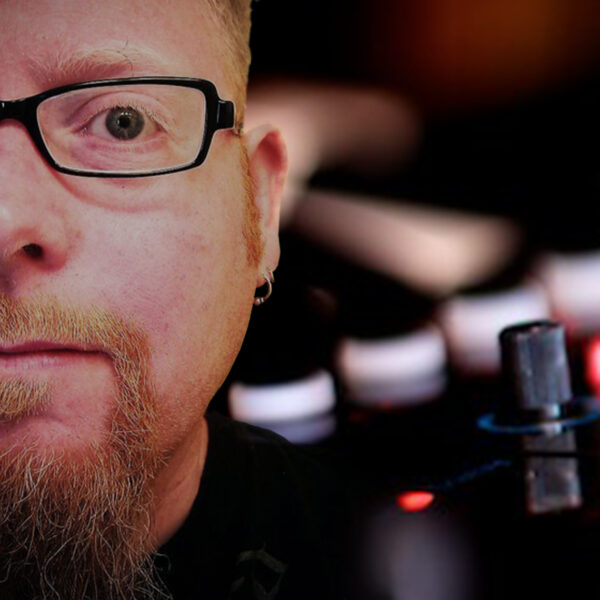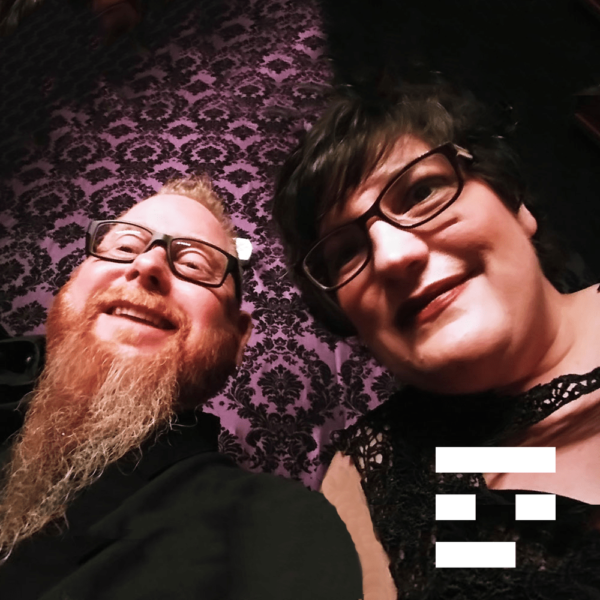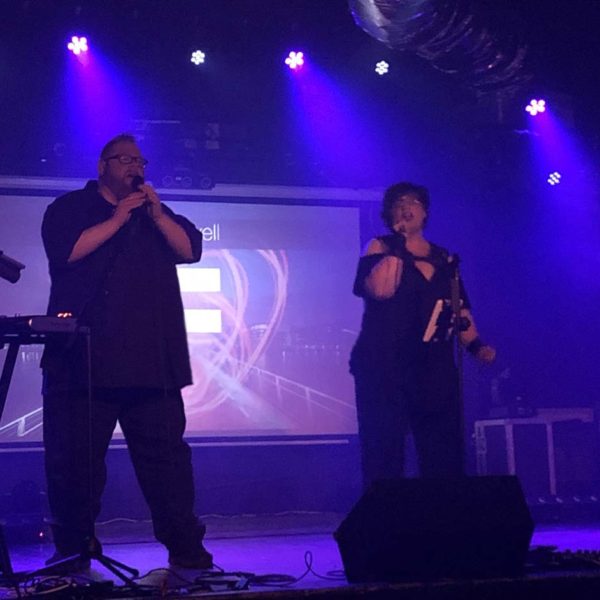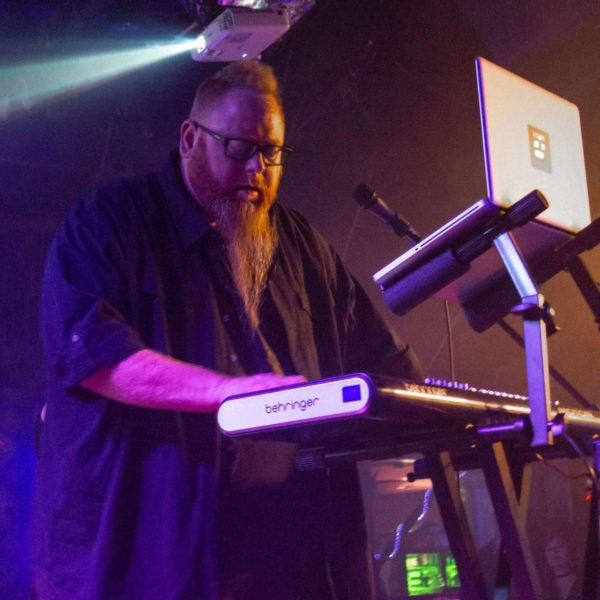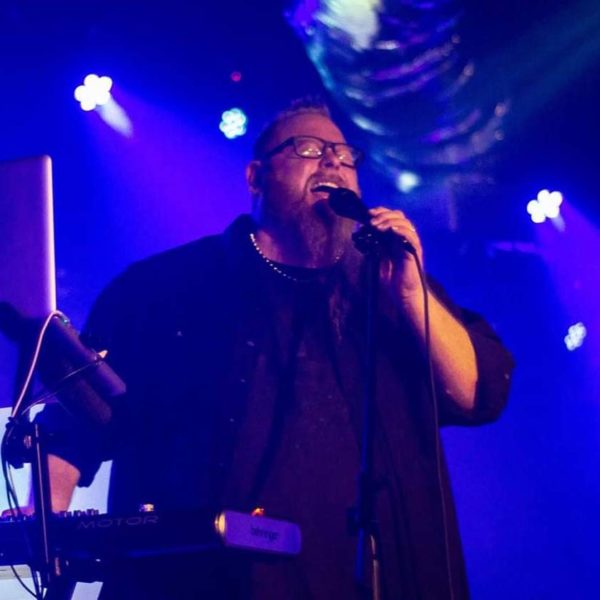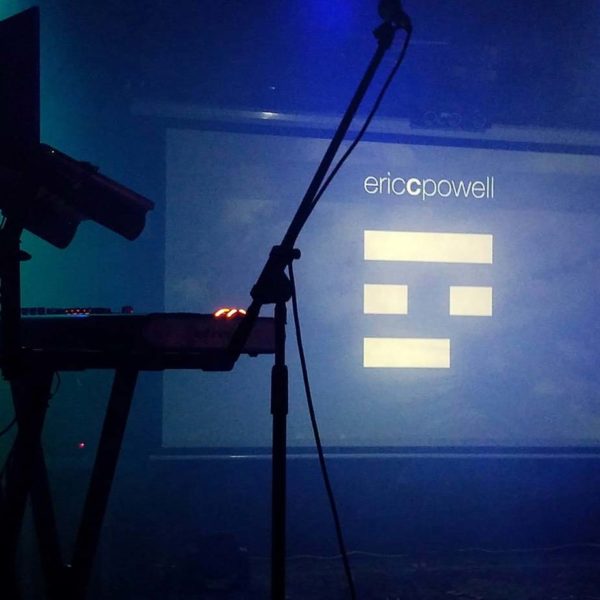Eric C. Powell
Eric C. Powell with music partner and wife Andrea Powell are an award-winning indie synthpop synthwave electronic music artist featured on BBC Introducing. Eric’s writing and production reflect his signature catchy synth tracks with strong vocals and penetrating lyrics to challenge any listener and delight synth enthusiasts. Andrea’s haunting vocals often express the longing of our hearts while saturating the soul.
Founders of the early 90s synth band Turning Keys who supported such acts as A Flock of Seagulls, Depeche Mode, and Missing Persons, Eric and Andrea returned to the electronic music scene with a new album Back to Life in 2016. They have since been fortunate to catch the ear of retro synth and synthwave audiences while growing their fanbase in the UK, Germany, US, Canada, and beyond.
Q&A
1) Who are the members of your band and how did you meet?
I’ve been a musician and songwriter for most of my life and Andrea and I met as teenagers being involved in various musical efforts. We first performed together when I asked her to sign with me for a weekly gig I had at a local restaurant in my High School years. LAndrea and I later founded the 90s synth band Turning Keys who received notoriety in the Southern California electronica underground. Currently, we share songwriting and vocal efforts, whereas I am responsible for most of f the sound design and production. We now have a number of collaborations and remixes to our credit, including work with DarwinMcD, Cheddr, Stereo in Solo, Cheddr, LorD and Master, Uncreated, Parralox, and more.
2) How long have you been in Austin and how long have you played music?
I physically moved to Austin Texas in 2014, although my heart was over a decade before. Andrea and I visited Austin in the Summer of 2009 for a music conference. We fell in love with the city and its history of culture (not to mention air conditioning). I think it was then that a seed was planted and it was only a matter of time before we made the move.
3) Has the city of Austin had any influence in the style or direction of your music?
Austin rekindled my love for synth-based music, inspiring me to become active again as a recording artist and performer. I received my first synth in my teens as a gift. It was a Roland Juno-106 – and that piqued my interest to search out other synth-based artists. The cultural atmosphere of Austin has been a catalyst inspiring me to create a public persona and to meet and encourage other electronic artists. In connecting with artist online worldwide, but also Austin, I am finding my way into the electronic, synthpop, and synthwave scenes.
4) Do you perform live shows in Austin, and if so, what are your favorite venues?
Oh man, remembering back to my days with Turning Keys, I love to perform! We had been promising for two years that we would be doing shows soon and we are finally back at it. Our comeback show here in Austin was at Elysium on April 26, 2019 and we haven’t looked back. The crew and regulars at Elysium are amazing and made us feel completely welcome and at home. It was a great show spurring us on to perform more.
5) Are there other bands in Austin you’d recommend to your fans?
It’s hard to recommend just one. I’ve been making it a point to connect with other electronic bands in Austin. There is a diverse range of electronic artists here in Austin and it’s great! We need to remember to appreciate diversity in music in supporting other artists. Hameryza, Flotron, and New Neon are my peeps. But Adoration Destroyed, Mr. Kitty, and of course Zurückspulen are also great artists in the area.
6) What musicians have most influenced you?
My foundational influences are Depeche Mode, Erasure, Yaz, InfoSoc, and A-ha. But recently, I’ve really enjoyed listening to Mesh, DeVision, Zynic, Torul, Chvches, Marsheaux, and a lot of indie synth-based artists.
7) What’s the best thing that has happened to your band?
First, it been amazing to connect with other artists via social media. This is not something you could do back in the 90s. The support and community has been a huge encouragement. Second, Noise Zombie is really caught people’s attention and helped us with notoriety in the UK scene. We’re super honored to have won 3rd place in the global SynthMaster 2018 Track Contest, received a 2nd place recognition of Best Electro Act in the 2019 Wigwam Awards, and recently received Best Dance Album and Best Song Composition from Clouzine International Music Awards. We are super humbled.
8) Any cringe-worthy moments the band has endured that you’re willing to divulge?
All of these are Turning Keys stories, but here goes. More than once we would throw the circuit breakers in a venue because we brought our entire own light show. We once hid our VIP party passes at a Grammy after-show in Hollywood when the promoter asked for them back (Robin Thicke was at that party years before he even thought of Blurred Lines). There was that time we played with Flock of Seagulls, but also the time the fog machine made so much fog we couldn’t see the synths keys in front of us. But my best story is about how we did our first show at the Roxy in Hollywood on the Sunset Strip. We were the opener for about five guitar-only metal bands. The Roxy staff was so mad at us because it took so long for us to set up. We had seven synthesizers, it was our first show, and we had not yet streamlined how to quickly run all the cables. Everything was live back then.
9) Is there anything you’d care to share or anything else you’d like to let us know about?
I think it’s really important that local artists support one another. We’ve been fortunate to tap into a whole network of artists via social media like Twitter and Instagram. Experiencing community in that way is important and I invite you to peruse my social feeds, but to also connect and drop me a message.
10) Give us one fun fact.
I used to record all my songs as a teenager using two cassette decks. I didn’t have a sequencer or DAW, so I would record one track on one, then overlay to another, and then another until the song was finished. Later, I discovered I could reassign the pads on my drum machine to play MIDI notes and that was a real eye-opener for me. I didn’t start using multiple synths and a sequencer until we formed Turning Keys.

